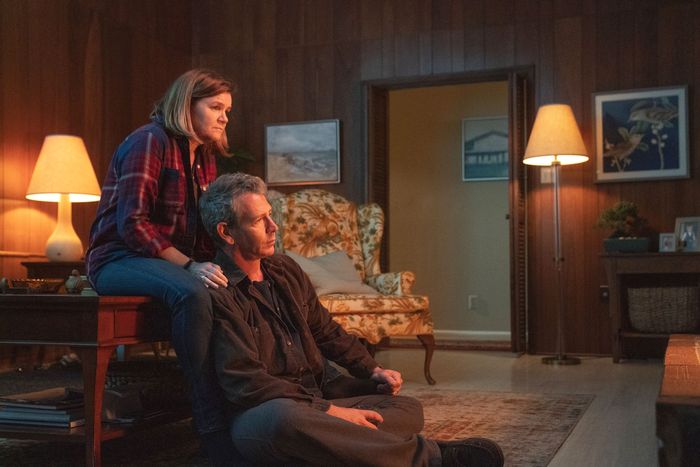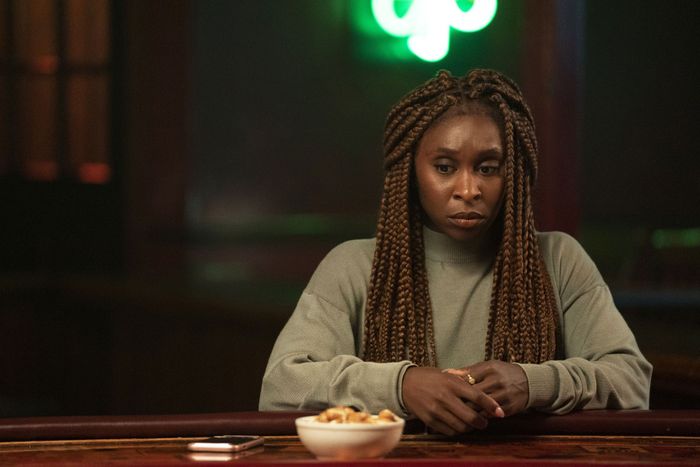
When it was announced that HBO had tapped Richard Price to adapt Stephen King’s hit 2018 novel The Outsider for a ten-part miniseries, it was clear that the author of Clockers and co-writer of HBO’s The Night Of would be adding his own voice to the project. Not only has King been notoriously difficult to adapt, it’s not something that would interest a writer as talented as Price if he couldn’t put his own fingerprints on it. And when the first episode of The Outsider sped through basically the first third of the book, it was clear once again that things were going to be different from the source material. How? As in any adaptation, there are minor changes throughout, like the physical appearance of supporting characters, which always changes through casting; but there are also some fairly significant departures that make this version of The Outsider unique.
First, a quick refresher. Both the book and show The Outsider are about the case of Terry Maitland (Jason Bateman), a man who is accused of murdering a local boy named Frankie Peterson. Ralph Anderson (Ben Mendelsohn) gets the case, and publicly arrests Maitland after overwhelming evidence, including several witnesses, security-camera footage, and eventually fingerprints and DNA. However, Terry is also on camera miles away from the scene at the time of the murder. The brother of the victim kills Terry, and Ralph becomes obsessed with figuring out how this conflicting evidence is possible, drawing in the assistance of a unique PI named Holly Gibney (Cynthia Erivo). The narrative of both the book and show are very close to the same, but there have been some changes worth noting; allow us to guide the way.
Derek Anderson
The most notable change is to a character we don’t see or hear in either version, but who haunts the HBO iteration all the same. In King’s book, Detective Ralph Anderson’s son, Derek, is absent but most definitely alive. On the show, it’s revealed early on that Ralph and his wife, Jeannie, have suffered the unimaginable loss of a child, and Price and his team have allowed this to influence the entire season for both characters. It’s one of the main reasons that this version of Ralph can’t give up on the case of Frankie Peterson and Terry Maitland — he needs to find justice for Frankie because, in a sense, justice was denied for his son. It also has made the Anderson family more connected to one of the main themes of the season, grief. The force that is destroying lives on The Outsider feeds on grief, and the fact that it could make a meal of the Andersons is one of the smartest decisions Price made in adapting the show.
Names
In a less significant but more puzzling alteration, Price and his team have for some reason changed the monikers of a few major players. Terry Maitland, Holly Gibney, and Ralph Anderson are the same, but supporting players have slight alterations. Attorney Howie Gold becomes Howie Salomon. Terry’s widow Marcy in the book becomes Glory in the show, and her daughter goes from Grace to Jessa. Remember the DA from the first episode who pushed the case forward with Ralph? In the book he’s Bill Samuels, but he’s Kenneth Hayes on the show. These sort of nonessential changes feel a bit like Price taking characters who didn’t have much detail in the book and claiming them as his own.
The Hooded Figure
One of the most essential images of the HBO version is that of a figure in a hoodie that doesn’t look quite human. He appears in the book, but much later than he does on the show. Remember how he was spotted at Terry Maitland’s shooting and near the attempted suicide of Frankie’s father? That’s a show creation, likely to foreshadow the supernatural events to come in a way that makes them less shocking as they work their way into the series. When it returns later in the season to haunt Jeannie Anderson, there’s a major change: In the book, Jeannie has a vision of someone telling her to make her husband stop the investigation that could have been a dream, but that vision is of a figure that looked a lot like Claude Bolton, which makes sense given that Terry scratched him in both iterations. The show seems to be holding the revelation that Bolton is the next link in the chain a little longer than the book.
Bill Hodges
The center of the first season of The Outsider has featured a character from the King universe who may be familiar, Holly Gibney. She’s actually been seen on TV before in the Audience Network’s Mr. Mercedes, where she is an associate of Bill Hodges, played by Brendan Gleeson. And she appears in three King books known as the Bill Hodges trilogy. In the book version of The Outsider, Alec Pelley finds her while looking for Hodges, but the show eliminates that character entirely, depicting Gibney as a loner running a private investigation business of her own, and she’s instead recommended by Howie Salomon. Reducing connections like Bill Hodges for Gibney is a smart move because it makes her even more of, well, an outsider.
Holly Gibney
There are changes to the Gibney character throughout the show other than just her practice. Her unique knowledge base has been amplified by Price, and her aviophobia is a show creation that allows for that terrifying bus scene in episode six. A lot of Gibney’s investigation, especially in New York, is a show creation entirely. From the beginning, Price made it clear that he was going to expand the role of Gibney, even trying to convince King to let him change her name. In the source, she does tie together Terry Maitland and what happened on that family trip to Dayton, Ohio, but she’s more of a supporting ally for Ralph Anderson instead of the co-lead she’s presented as on the show. So the vast majority of the differences between the book version of The Outsider and the show can be found in detailing what may have happened but went unsaid in the source. For example …
Andy Katcavage
Holly needs people to talk to. By expanding the Gibney character and detailing her investigation in ways that King does not, the show adds supporting characters completely absent from the source, including former officer and current security guard Andy Katcavage. So every scene between Andy and Holly is a show creation by Price. A character who works as both an assistant in the investigation and love interest for Holly, Katcavage allows the show to push the narrative forward as the two discuss the case. Otherwise, Gibney would have to do a lot of talking to herself or calling Ralph to replace the internal monologue that’s more easily executed in a book.
Maria Caneles/El Cuco
In the book, the case of Terry Maitland is traced back to a similar crime in Dayton, Ohio, which was committed by Heath Holmes (renamed Hofstadter in the show), who also had conflicting evidence both exonerating and vilifying him. The show takes it a step further, drawing a connection from Hofstadter to Maria Caneles, a New York woman in the same horrible boat, and now the only living victim of this nightmare that we know of. The path to Maria also changes the way that El Cuco is introduced to this universe: Yunis Salbo actually offers it first in the book, whereas on the show Holly gets the lowdown on the ancient evil from a woman who overhears her talking to Maria. In fact, the presentation of evidence in the book includes a Mexican film about El Cuco, which Yunis supports. In episode six of the show, Holly is kind of hung out to dry and disbelieved by most people in the room, even if they slowly start to come around by episode’s end.
Tracey Powell
The saga of Heath Hofstadter’s cousin Tracey Powell is a show creation, and one that could have big implications for where the season is going. As seen in episode five by Holly at the cemetery, Powell has the same neck rash as Jack Hoskins, and it’s revealed that his prints were found in the car in which the girls Hofstadter killed were kidnapped. He dies of suicide by cop because of what he knows or what he did. All of this is a show creation — King doesn’t provide as much detail into the Hofstadter case or its repercussions as Price, but it definitely feels of a piece with King’s vision of an ancient evil with enough power to destroy entire families.
Jack Hoskins
The cop with the awful temperament does get “caressed” in the book by the force that’s in the barn, but the encounter is more violent on the show. Hoskins’s descent into whatever now has a grip on him is slightly different, as the internal monologue of the book allows King to make it clearer that he is literally being instructed and ordered around by El Cuco, turned into a Renfield for this world’s Dracula. The endgame for Hoskins also seems different, as the end of episode six puts him in a car with Holly Gibney in a foreboding manner that’s unique to the show. We’ll see if the final arc for Jack and the HBO version line up soon.




